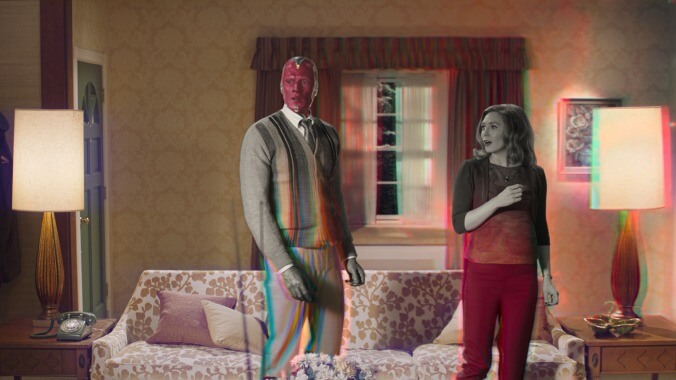WandaVision’s Marvel Cinematic Universe roots undercut its puzzle-box ambitions
Image: Photo: Marvel Studios
The success of the Marvel Cinematic Universe is an undeniably complicated thing: a vast, multi-billion-dollar clockwork creation of interconnected franchises, carefully deployed star power, and precisely timed scheduling, all backed by the production might of the world’s largest and most omnivorous media conglomerate. The reasons for its success are a whole lot simpler, though: Marvel movies give people—a lot of people—what they want, exactly when they want it, and in regular and generous doses.
Wanna see Spider-Man swinging across New York with his surrogate daddy Iron Man cracking quips on the fly? You got it, fan. Want to see the Hulk get in touch with his inner rage, kicking seven kinds of alien dragon ass? It’s all yours, True Believer. In the expertly machined satisfaction engines of the MCU, if there’s a hammer on the mantlepiece in the first act, you had damn well better believe that Captain America is going to start swinging it in the third. (Or 11 movies later, as the case may be.) And none of this is bad—indeed, it’s almost supernaturally satisfying. But that same urge to serve up a family-sized platter of dopamine to hungry audiences is an impulse that now threatens to complicate the mega-franchise’s first “official” foray into TV (after all those other forays into TV), Disney+’s WandaVision.
It’s worth examining, three episodes into its run, what kind of show WandaVision is, and what TV trends it’s pulling from. Whereas Disney Plus’ first major called shot, The Mandalorian, achieved success by boiling its billion-dollar parent franchise down to its DNA, serving up a steady slew of well-made space-based adventure stories, WandaVision has quickly proven itself far more ambitious in its reference pool. Move beyond the series’ (excellent, charismatic, and legitimately funny) mimicry of classic sitcom tropes, and it’s pretty clearly the Marvel version of a mystery-box show, with lead characters trapped—to varying degrees of awareness—in a sort of epiphanic, invisible prison. It’s Lost, but in soothing Brady Bunch color tones. Westworld with a laugh track. The Prisoner, if No. 6 was trapped in Dick Van Dyke’s kitchen.
It’s a fantastic premise, honestly, one informed by Wanda Maximoff and Vision’s complicated comic book history, as well as 70 years of beloved sitcom sandboxes for the show’s cast and crew to play in. But it also sits in direct opposition to the MCU ethos, which can tolerate a mystery for exactly as long as it takes its antsiest audience member to start to squirm. To withhold information—to withhold anything—is counter to what turned these films into a pop culture institution, and that necessity to provide gives WandaVision the sense of a show being pulled in even more directions than its already bifurcated premise might suggest. Black-and-white trappings or no, WandaVision exists fully within the Marvel Cinematic Universe, and in the MCU, even the subtlety must arrive in capital letters.








































